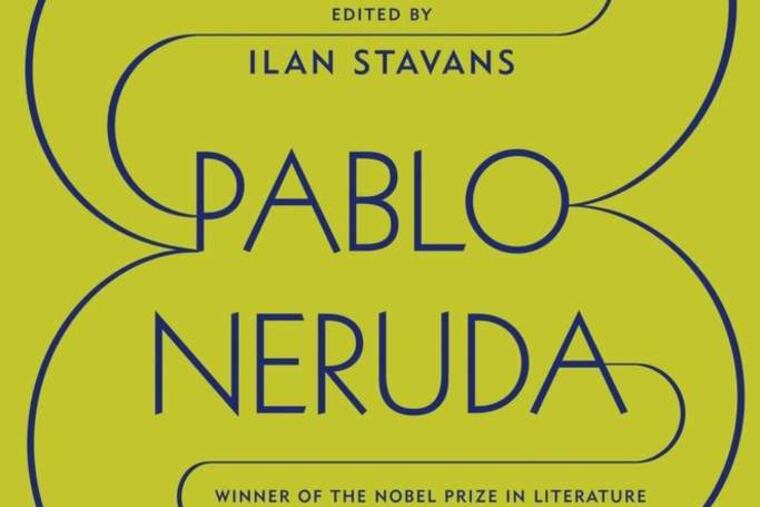'All the Odes' is oodles of wonderful Neruda
How could you not love this book? Put it by the bedside. Or by the porcelain convenience. Anywhere you find yourself alone with a minute. Flip pages to a random ode, and have a ball.

A Bilingual Edition
By Pablo Neruda
Edited by Ilan Stavans.
Farrar, Straus and Giroux. 896 pp. $50
nolead ends nolead begins
Reviewed by John Timpane
How could you not love this book?
Put it by the bedside. Or by the porcelain convenience. Anywhere you find yourself alone with a minute. Flip pages to a random ode, and have a ball.
This book collects English translations, facing the Spanish originals, of all 226 odas or odes written by the Chilean Nobel Prize-winning poet Pablo Neruda during his long, fruitful career. These are direct, open, rapid, often joyful poems addressed to things of this world - onion, building, butterfly, eye, horse, washerwoman, envy, old poet, typography (yes!), Paul Robeson . . . . It's a grateful, grief-stricken, revolving-in-wonder song of life on Earth, a reminder, in short, skinny bursts, of the thrill of what's in front of us.
You'll never find a better ode to French fries.
As far as editor Ilan Stavans or I know, this is the first time all of Neruda's odes - written throughout his career, but concentrated in a burst of creativity and self-reimagining in the 1950s - have appeared, with facing English translations. Twenty translators are involved, including poets such as Mark Strand, Edward Hirsch, and Nathaniel Tarn. Many odes, like those to Robeson, onion, or watermelon, are much anthologized. Together between covers, they're like an idling nuclear reactor of pleasure.
What the heck, you may ask, is an ode? Whatever Neruda said it was. His are slim stings of short lines that run down the page, looking much like his native Chile. No regular rhyme or traditional form, but plenty of music, plenty of shape. The few "rules" include Be direct and Don't overpoeticize things; let their beauties speak for themselves. Neruda was trying to get out of the straitjacket of the authoritative "great poet" and just sing. If not uniformly successful, these poems fly free remarkably often.
They hit us often with an opening image, casting us into the midst of experience, as in "Ode to Bird Migration," as translated by Stavans:
Along the sea
line
toward the Grand North
a
spilled
river
on the sky:
it's the birds
from the South, from the snowdrift,
coming from the islands,
from the snow:
Antarctic hawks,
cormorants dressed
in mourning,
austral petrels out of exile.
Many start with direct address to the object/subject, as in "Ode to the Atom," translated by Margaret Sayers Peden:
Infinitesimal
star,
you seemed
forever
buried
in metal, hidden,
your diabolic
fire.
Plenty of fresh metaphors and phrase-turns, as throughout Neruda: that "spilled river" of birds, the atom as "infinitesimal/star." He was trying to find a people's poetry that was still poetry, spare but expressive, explosive. To the Spanish poet Federico García Lorca (still alive at the time), he writes: "let our words be simple, as you are and I am." He says much the same to Arthur Rimbaud.
Even in his amazement, Neruda acknowledges evils and ironies. The splitting of the atom was a great thing - "you traveled through/ cities,/ your great brilliance/ illuminated lives." But the dark side is very dark: "you were a/terrible fruit/of electric beauty." The sadness of this world, Neruda tells Lorca, "is all/the friendship of a melancholy manly man can offer."
These urges rose from Neruda's humane, socialist/materialist heart, impatient with institutional lingo, with the way poetry "ought to sound." If we could be equals, see clearly, and speak straight to one another, perhaps this is how we might talk: in a healthful, cleansing poetry.
By far most of the odes strike me as still vigorous. And Stavans' notes explain much that has gone forgotten. As for politics, Neruda, loyal leftie, doesn't always evade the leadenness of dutiful language. His odes to Lenin and Leningrad always fell flat to my ears. And his ode to Stockholm is weirdly depressed: He misses the Russia just visited. Somehow, no.
On the other hand, his ode to Paul Robeson, political to its core, is a masterwork.
Many masterworks. "Ode to the Dog" balances affection with bemusement. How wonderful that the dog, on a morning walk with its master, seems to ask what life is, "why it's daytime, why night comes," and, of course, his owner says, "I have no answer."
The translations are accomplished; some are better than others. In Spanish, these poems have an idiosyncratic amble, a bracing, South American music you can't furnish into English.
You might ask: "If this book were an argument about the nature of life, what is Pablo Neruda's conclusion?" If you read All the Odes, you will live more alive to the living world. And that world is a vibrant, amazing place. Sorrow and pain? Of course: "Without thorns/I cannot/crown/my heart/(which has worked/so hard)" ("Ode to My Grief"). Although it holds tragedy and sorrow, however, life for Neruda is not a doomed emptiness but a light-shot fullness. As he says in "Ode to Life":
The cup of life
brims
with translucence.